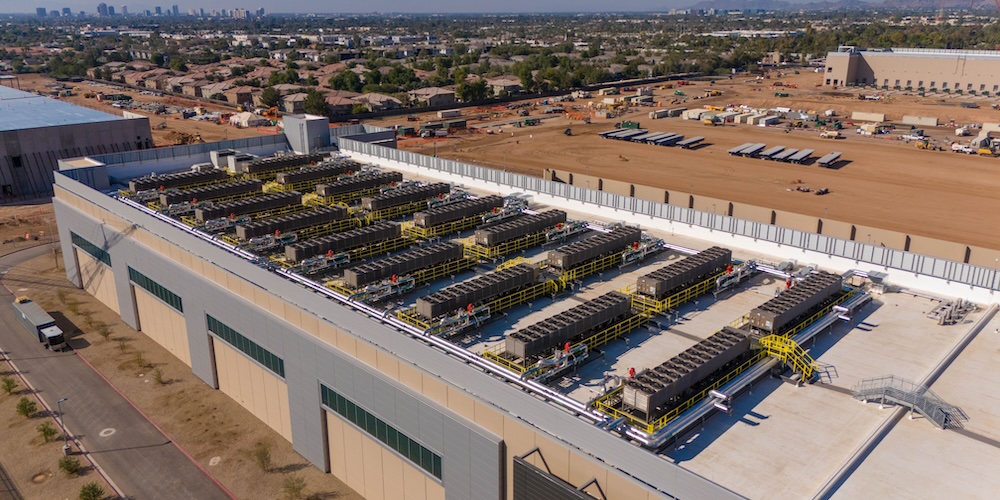— 5 min read
Building the Ideal Project Team for Data Centre Construction
Last Updated Apr 28, 2025
Last Updated Apr 28, 2025

The digital age has ushered in an era of unprecedented data consumption, fuelling a seemingly insatiable demand for data centres. These complex facilities are driving a construction boom, placing immense pressure on the industry to deliver projects quickly, efficiently and to the highest standards.
A key factor determining the success of any construction project lies in the composition of the ideal project team. Constructing a data centre – built to house incredibly sensitive and expensive equipment – only adds to the need to assemble the right team with the right skills to deliver the right results.
Table of contents
Who’s on the data centre team?
Constructing a data centre is a multifaceted undertaking, demanding a diverse range of specialised skills and experience. A well-rounded data centre project team should include the following.
- Project manager
The linchpin of the project, the project manager is responsible for overall planning, execution, budget control and programme adherence. Experience in data centre construction is highly desirable. - Construction Manager
Overseeing daily on-site operations, the construction manager makes sure safety protocols are followed, quality standards are met and the project stays on track. - Electrical Engineers
These engineers design and implement the intricate power distribution systems that are critical for data centre functionality. - Mechanical Engineers
Mechanical engineers are responsible for the cooling systems, ventilation and other mechanical infrastructure necessary for maintaining optimal operating environments. - Network Engineers
Unique to data jobs, network engineers create the high-speed network infrastructure that connects servers and facilitates data transfer. - Commissioning Engineers
These engineers validate and verify that all systems perform as designed and meet the required specifications before handover. - Specialised Contractors
Data centre projects need speciality contractors who are experts in areas such as sustainability, energy efficiency, fire suppression and security systems.
Technical Skills for Technical Times
As with any project, a well-rounded team should include a project manager, serving as the project’s conductor, responsible for overall planning, execution, budget control and programme adherence. In this case, though, a PM with experience in navigating the complexities of data centre construction is invaluable.
The urgent need to efficiently cool data centres and their equipment requires the pooling of skilled and innovative mechanical, electrical and plumbing professionals. Within a data centre construction project, electrical engineers are key to designing and implementing the intricate power distribution systems that are absolutely essential for data centre functionality, while mechanical engineers are responsible for the cooling systems, ventilation and other mechanical infrastructure necessary for maintaining the optimal operating environments within the facility. Finally, a plumbing engineer will help design and implement the complex water systems for the aforementioned cooling system as well as fire suppression.
Becoming more typical on high-tech construction projects such as data centres are network engineers, who have recently been brought in to design the high-speed, robust network infrastructure that connects servers and facilitates seamless data transfer. Their work ensures that the centre is an actual functional data centre, usable by the client once construction has been completed.
Commissioning engineers are charged with validating and verifying that all systems perform as designed and meet the required specifications before handover from constructor to client. Additionally, contractors with essential expertise in specific areas such as sustainability, energy efficiency, innovative cooling systems, modular construction and enhanced security systems can all be helpful throughout the life cycle of the construction project.
The soft skills still matter.
Beyond technical expertise, a range of soft skills are equally important for team success. Open, transparent and frequent communication is absolutely vital for keeping everyone aligned, informed and proactively addressing potential issues before they escalate.
Data centre projects, by their very nature, demand seamless collaboration between different disciplines. This task often falls to the PM, who should have the ability to identify and resolve challenges quickly and effectively to maintain project momentum and avoid costly delays.
The data centre landscape is constantly evolving, with new technologies and methodologies emerging regularly. This dynamic environment requires leadership and team members to be adaptable, embrace change and continuously learn and upgrade their skills.
So, creating a positive and supportive work environment is essential for recruiting top talent and retaining the best employees. A culture of open communication, collaboration, mentoring and mutual respect fosters employee engagement, boosts productivity and contributes significantly to building a culture that drives the business. Attracting and retaining the best talent in a competitive market requires not only competitive compensation but also a positive and supportive work environment where individuals feel valued and have opportunities for growth.
With all projects, but especially data centre construction projects, technology is its own team role. Project management platforms, Building Information Modelling (BIM) software and a range of other collaboration tools significantly improve communication, streamline workflows and enhance data visibility.
These tools have become extremely important for mitigating risk and loss through enhanced data visibility. These technologies drive efficiency and productivity with streamlined communication and collaboration so everyone is on the same page and working towards common goals. They also empower data-driven decisions by providing centralised data platforms with valuable insights into project performance, enabling informed decision-making at every stage of the project life cycle.
Building the ideal project team for data centre construction requires a strategic and holistic approach that carefully considers both technical expertise and essential soft skills, all connected by technologies that make collaboration and communication a bit easier. By focusing on these key elements, construction companies can create high-performing teams capable of delivering projects on time, within budget, within scope and to the highest quality standards.
Categories:
Tags:
Written by
Nicholas Dunbar
33 articles
Nick Dunbar oversees the creation and management of UK and Ireland educational content at Procore. Previously, he worked as a sustainability writer at the Building Research Establishment and served as a sustainability consultant within the built environment sector. Nick holds degrees in industrial sustainability and environmental sciences and lives in Camden, London.
View profileExplore more helpful resources

Construction Management Software: Essential Tools for Modern Building Projects
Today’s construction projects face tighter timelines, rising costs, and increasing compliance pressures. Teams must juggle numerous variables while communicating across multiple job sites, making traditional tools increasingly inadequate. Fortunately, construction...

Building for Big Data: An Industry-Wide Challenge to Innovate
The demand for innovative and efficient data centres is skyrocketing. From powering cloud computing and the exponentially growing use of artificial intelligence to supporting the ever-growing internet of things (IoT),...

Construction Scheduling: An Essential Guide
Every successful construction project begins with a solid plan, and at its core lies an effective construction schedule. From breaking ground to final handover, staying on time and within budget...

Gantt Charts: Visual Roadmaps for Construction Success
In the complex world of construction, even well-planned schedules can quickly slip. From overlapping trades to shifting delivery dates, the best-laid plans often unravel. This is precisely why construction Gantt...